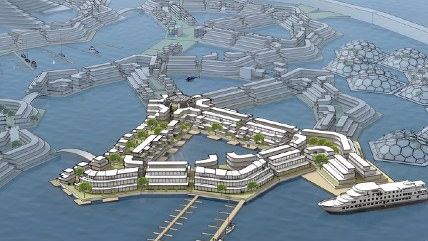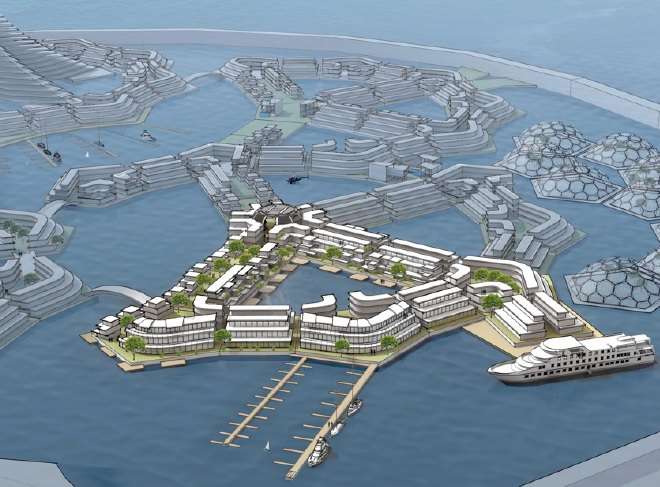Seasteading New Nations Becomes a Practical Engineering Challenge


When it comes to large numbers of people living in close proximity to the ocean, few people can beat the Dutch for experience. So, it makes sense that a Dutch engineering firm, DeltaSync, which specializes in "floating urbanization," was hired by the Seasteading Institute to develop initial plans for habitations at sea that would be safe, practical and meet the institute's goal "to guarantee political freedom, and thus enable experimentation with alternative social systems." With initial designs and specifications now delivered, the dream of floating political experiments takes an important step toward becoming reality.
DeltaSync's Seasteading Implementation Plan works from the premise that early efforts will be anchored in sheltered harbors—specifically, the Gulf of Fonseca, bordering El Salvador, Honduras, and Nicaragua—until more experience is acquired. The modular design is still intended to be mobile, however, and potentially suitable for deep-sea location if surrounded by a breakwater.
The first-draft design assumes the construction of concrete modules, 50 meters by 50 meters, each with a population of 225 people, which can be easily connected and disconnected. The modules could be moved by tugboat and linked in various configurations as needed. And those configurations could then be rearranged to suit the needs and preferences of community members.
In terms of sustainability, the plan envisions algae farming, aquaculture, and aquaponics for growing fresh vegetables, so that at least some food could be locally sourced. Rainwater would be collected for freshwater and as an alternative to energy-intensive desalination or importation.
Speaking of energy, a tropical, oceanic location lends itself to solar power collection, with battery storage and backup diesel generators.
And the "why" of all this? That is, what's the motivation to wave goodbye to friends, family, and the nice people in the local bureaucracy to set up shop on a man-made island, far from tax collectors, regulators and— Wait, That answers itself, doesn't it? Nevertheless, the plan considers the question.
While experimentation with rules and new forms of government is the highest priority for the seastead, economic influences cannot be ignored. This means the city should be attractive for a diverse array of manufacturing and service-based companies. Also sufficient incentives should be developed for companies and entrepreneurs to move to the seastead. Such incentives should include: clear and simple legislation, low taxes, lower office rents than in the city center, a diverse and well-educated work-force, access to knowledge, technology and innovation, good (public) transport connections to the wider metropolitan area, especially when the city is small at the beginning. Another important asset is the access to global markets by connections to an airport and seaport. The marketing to attract these businesses to the floating city should be very good. The first floating city in the world will also attract a large number of tourists, in order to create opportunities for recreational businesses like hotels and restaurants.
None of this is a done deal, yet. Barriers remain to creating independent or semi-independent new communities at sea. And while those barriers are real, they increasingly look political, and surmountable, as the engineering and economic hurdles to such projects are understood and overcome.
What's interesting about seasteading is that the mere ability to create new nations where innovators and dissenters might find refuge could put pressure on existing nations to at least moderate their excesses, even if the floating communities don't attract vast numbers of residents. The United States and Europe have been trying to reduce policy competition in recent years, specifically targeting "tax havens." Seasteading could blow that all open again, by creating new competitors.
Don't miss Brian Doherty's coverage of the early days of the seasteading movement.
Editor's Note: As of February 29, 2024, commenting privileges on reason.com posts are limited to Reason Plus subscribers. Past commenters are grandfathered in for a temporary period. Subscribe here to preserve your ability to comment. Your Reason Plus subscription also gives you an ad-free version of reason.com, along with full access to the digital edition and archives of Reason magazine. We request that comments be civil and on-topic. We do not moderate or assume any responsibility for comments, which are owned by the readers who post them. Comments do not represent the views of reason.com or Reason Foundation. We reserve the right to delete any comment and ban commenters for any reason at any time. Comments may only be edited within 5 minutes of posting. Report abuses.
Please to post comments


I'm the very epitome of "landlubber", but ever I would move out to sea for the chance at freedom.
I too would be very tempted to put all my family's possessions in our Conestoga pontoon and head on out the Oregon Sea Lane for more freedom.
Think of the panic though of the collectivists as the brain drain took place.
If it was 150 years or so ago, I could see the tax collectors setting up shop in St. Louis and confiscating the goods of anyone who was preparing to head west to start a new life on the prairie.
You might prefer Honduras's ZEDE.
"I'm going to build my own country! With blackjack and hookers!"
Can't forget the cocaine.
The libertarian trinity?
Cheaper plan: lease an island from a weak government. Build up libertarian populace. Declare independence from weak government. Request peace armistice from UN. Ignore all rules dictated by UN in perpetuity. Utopia.
Hey, it worked for that dude in Australia.
Why lease?
http://www.privateislandsonlin.....-das-pacas
As I recall, some libertarians tried to homestead an unclaimed island without guns. The King of Tonga took his US Navy surplus destroyer and shelled them to oblivion.
To set up one of these things and be left alone, you have to have a credible defense strategy. Holding the US power grid hostage, for example.
http://harryblutstein.com/history/seasteading/
OT: 2013 local news bloopers. Because it's Friday. And I didn't really get the Bok cartoon.
Ah, I remember Hugh Janus.
That poor fucker in North Dakota (the one that says "fucking shit" into a live mic at the anchor desk) still slays me.
It wasn't this year, but this one probably never gets old.
Won't each seastead also need its own navy, or at least a few smart torpedoes that are effective against craft large and small?
Arr, there still be pirates, matey...
Just stay away from US torpedoes manufactured before 1944. Get them from a reputable commercial manufacturer.
or at least a few smart torpedoes that are effective against craft large and small?
http://www.helimax-rc.com/heli.....6-1sqvcam/
The main risk of taxation is that the IRS will require withholding on all financial interactions with seastead countries, negating much of the tax benefits for Americans and thereby depriving the seastead citizens of full arbitrage with Americans. We could also see FATCA morph to include requirements that foreign financial institutions disclose any dealings with or transfers to seastead countries. Anonymous intermediaries in Mauritius or Nauru may serve for a while but eventually the big countries with hard to pressure the little ones to curb arbitrage.
We may even see some sort of embargo or tariff regime if the US gets desperate. They can block cross border interaction if determined to do so, without firing a shot.
^THIS.
Plus, being cut off from the SWIFT system a la Iran.
Fascist globalists are going to enforce fascist policies globally.
The main risk of taxation
I would counter that the main risk is insurability.
I don't mean taxation is the main risk, just that the IRS can still reach it indirectly if Congress gets its imperial dander up.
I can see this for the rich, but where do the laborers live? ie, the cooks, waiters, trash collectors, etc.
Given the expense of space and real estate, even first-generation seasteads would use automation whenever possible. The technical folk responsible for upkeep and care of the automated systems would be rich enough to live among the rest of the rich.
Better plan on having plenty of defensive firms ready. And those firms should consider anti-air measures to keep drones from dropping Hellfire missiles onto various platforms. One imagines the US won't sit idly by while its citizens flee to safer and less bureaucratic havens.
Who is going to build this, though? Pretty much all the rich people love the government. After all, they don't pay taxes, and the government keeps them rich by stifling competition and keeping wages low by providing basics that minimum wage won't provide (food stamps, social security, now health care).
I was first planning my libertarian country in Madagascar, but even there there's just too many people already
So I switched it to Southern Suriname, and more broadly the whole jungle mountainous area in the Southern areas of Guyana, Suriname, and French Guiana. One of the least densely populated areas in the world.
Why seastead? Let's not be pussies and just slowly take over an area. It'll be quite an adventure.
More realistic alternatives involve moving to more libertarian areas with a stronger culture. I live in New Jersey, but I feel like Texas is one of the only states that will have a future after the American government inevitably collapses. Both because their economic policies aren't totally commie, they welcome development (at least industrial development), and of course mineral/resource extraction, but also the state actually has a CULTURE, which the blue states totally do not have.
Or, what was the Eastern Europen country that for whatever reason all the college students are being taught libertarian/classical liberal ideals? I remember reading an instapundit linked article
Poland?
A fascinating read that discusses how sea colonization is good practice for eventual space migration. I hope thorium's promise pans out to solve the energy production bottleneck as it seems Ocean Thermal Energy Conversion and uranium oxide nuclear reactors are insufficient for this application.
"potentially suitable for deep-sea location if surrounded by a breakwater." Breakwater or not, I'd be afraid of storms and rogue waves in a deep-sea location. Still interesting though.